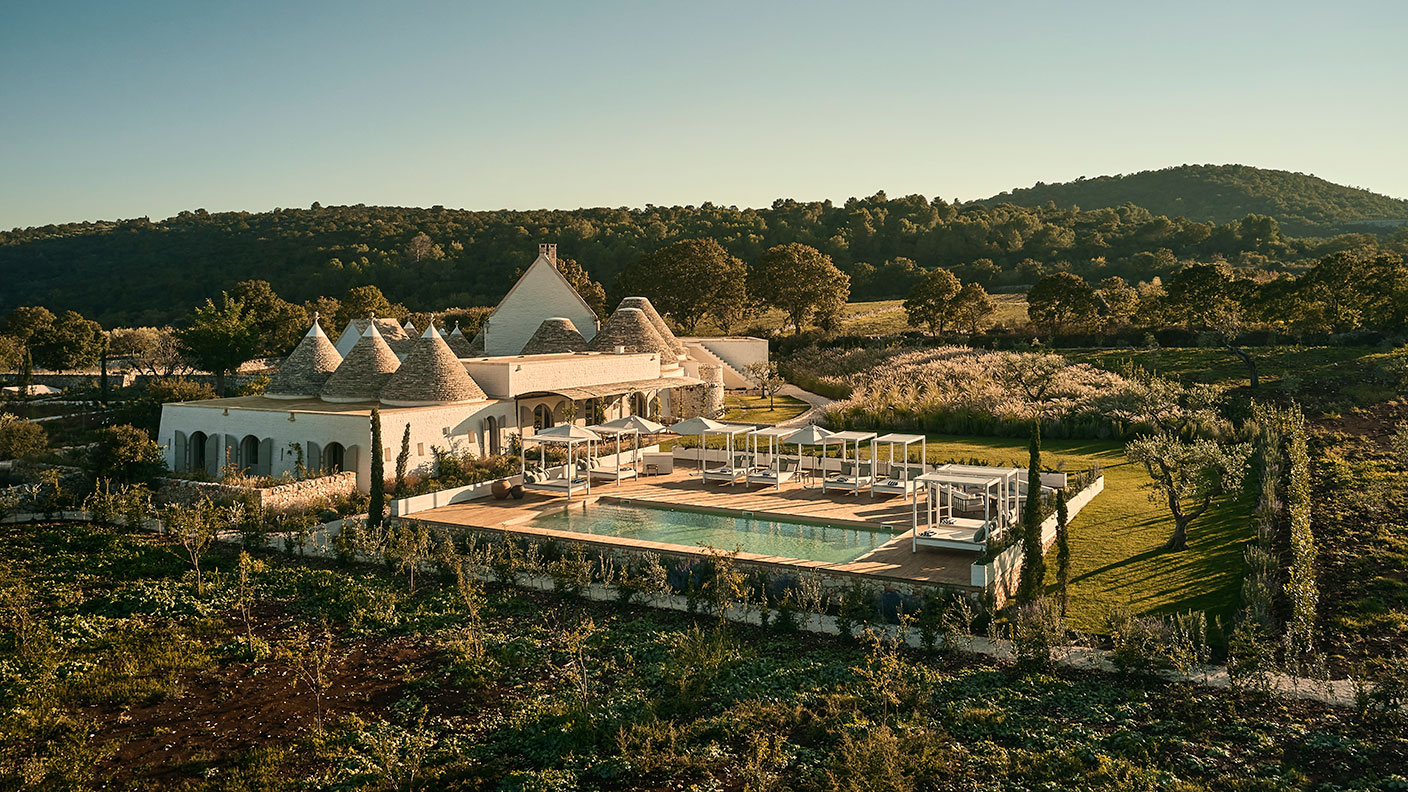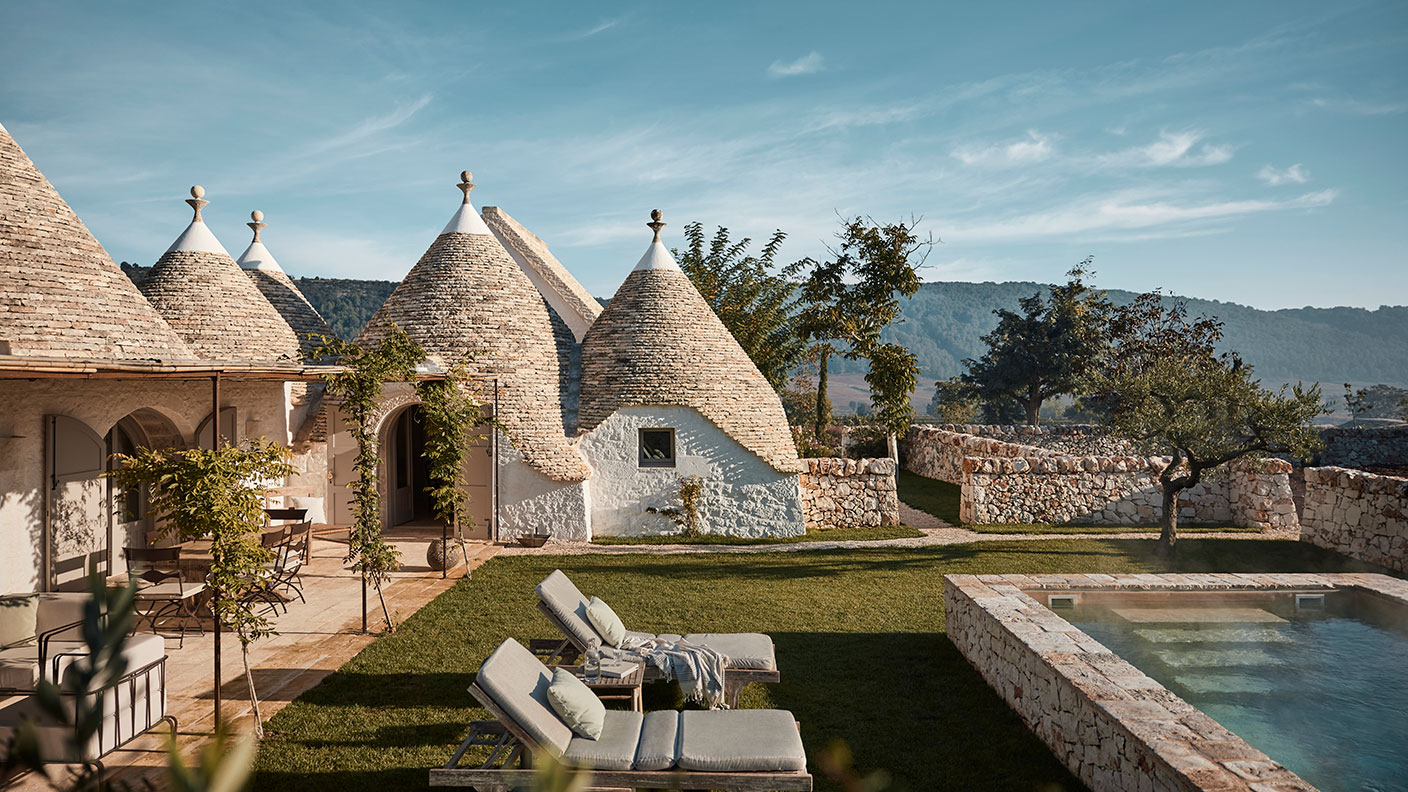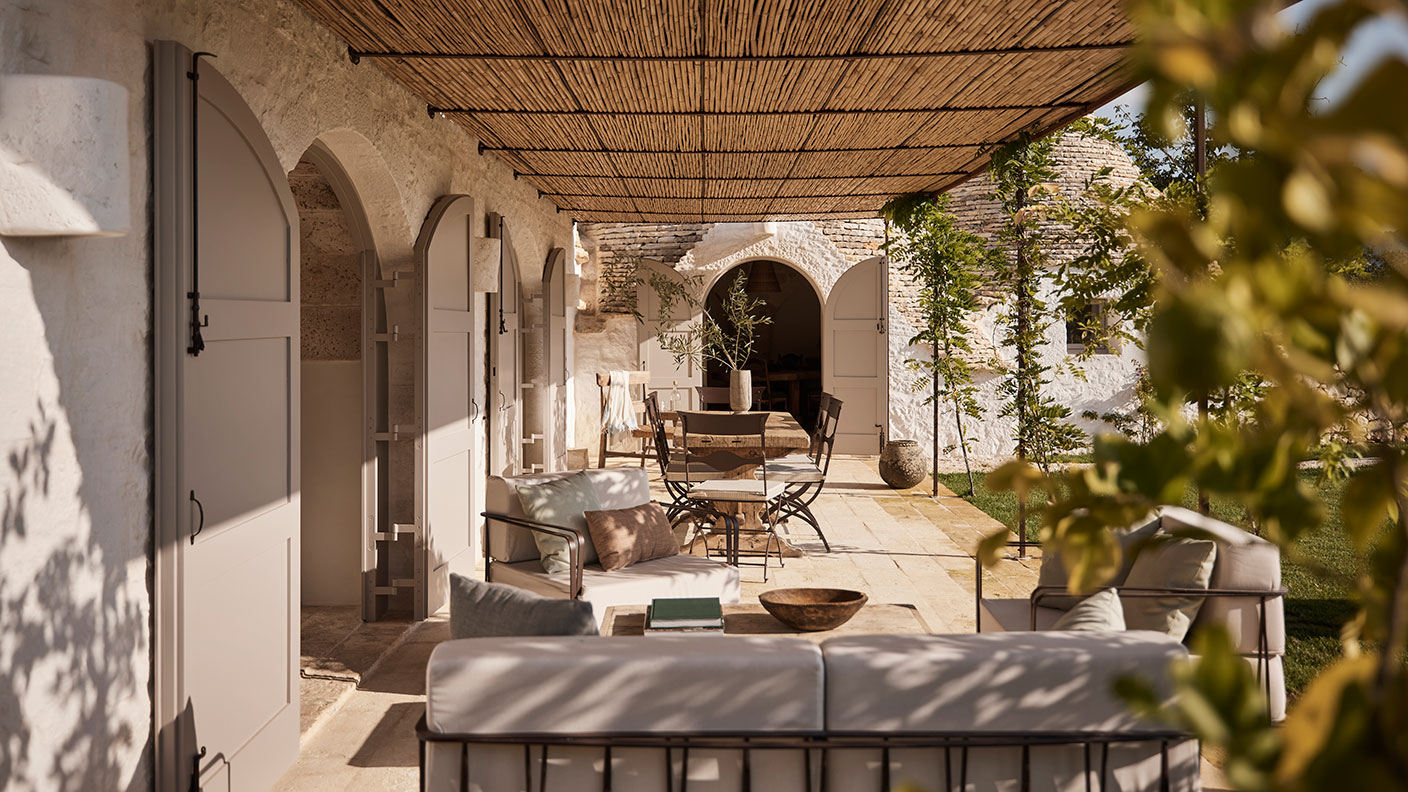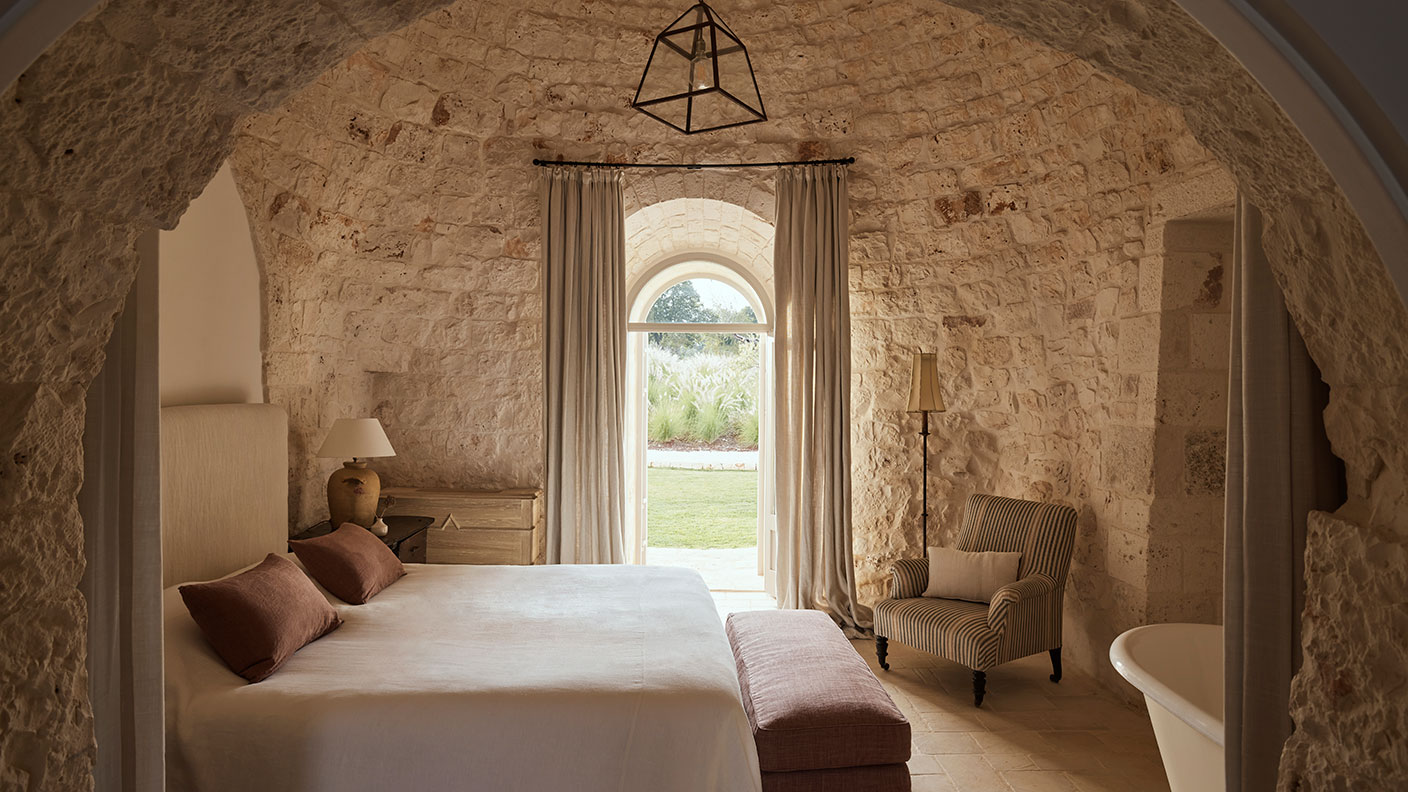Masseria Pistola: rustic charm in Puglia
The newly renovated farmhouse in southern Italy offers a stylish and tranquil stay


Get the latest financial news, insights and expert analysis from our award-winning MoneyWeek team, to help you understand what really matters when it comes to your finances.
You are now subscribed
Your newsletter sign-up was successful
Want to add more newsletters?

Twice daily
MoneyWeek
Get the latest financial news, insights and expert analysis from our award-winning MoneyWeek team, to help you understand what really matters when it comes to your finances.

Four times a week
Look After My Bills
Sign up to our free money-saving newsletter, filled with the latest news and expert advice to help you find the best tips and deals for managing your bills. Start saving today!
Southern Italy’s Itria Valley is a sweeping vista of lush vines and olives groves, among which is nestled one of Puglia’s cosiest luxury getaways – the warmly redesigned farmhouse home, Masseria Pistola. The mid-18th-century property has undergone a renovation that has added a contemporary twist to its homely feel, while remaining sensitive to its past. The main cumersa (meaning gable-roofed) house sits at the heart of the property, combining a spacious living room with a games table and bar, a kitchen, and terrace for al fresco dining. It also has four en-suite bedrooms – two upstairs and two downstairs.
The nearby Pagliano building has a beautiful and spacious en-suite master bedroom, with an outdoor shower and a welcoming living room. There are also three trulli – small, traditional stone buildings with vaulted ceilings and en-suite bathrooms that face a shared private lawn. Then there is the secluded Trulli Cottage, with its shaded terrace and garden with a private plunge pool.

The farmstead features communal areas, such as around the swimming pool. But there are private nooks to lose yourself in, all within a 30-hectare estate, surrounded by attractive gardens. Indeed, exploring the grounds takes some time as you wend your way past the flowerbeds and plants, the tranquil pools, the house itself and into the base of the valley.
MoneyWeek
Subscribe to MoneyWeek today and get your first six magazine issues absolutely FREE

Sign up to Money Morning
Don't miss the latest investment and personal finances news, market analysis, plus money-saving tips with our free twice-daily newsletter
Don't miss the latest investment and personal finances news, market analysis, plus money-saving tips with our free twice-daily newsletter

Food to savour
The food provided by the attentive staff is excellent. Be prepared to eat like a Roman emperor. I spent my first night at Masseria Pistola lounging at the dinner table, as ever more delectable dishes were ferried out from the kitchen. Out came fresh and zingy bruschetta, courgette flowers stuffed with cream cheese, sizzling steaks, pasta flavoured with pistachio and stracciatella di bufala cheese. To drink, I recommend a refreshing negroni sbagliato cocktail of Campari and sweet vermouth, topped up with sparkling Prosecco.
My bedroom was stylish and comfortable. Everything was smooth white stone, from the floors to the countertops to the dividing wall that separates the open-plan space from its walk-in shower (a delightfully powerful one, I might add). The roll-top bath is pleasingly deep.

In the morning the room was bathed in sunshine. It was a balmy 25°c in November, and it is, of course, warm in spring – Puglia enjoys 300 days of sunshine a year. Outside, the colourful gardens beckoned a few steps from my door.
Guests are naturally tempted to wander among the roses at sunrise; they should indulge. There are over four hectares of densely planted flora, and a fragrant sea of aromatic Mediterranean plants arranged by Chelsea designers Lulu Urquhart and Adam Hunt, who won a gold medal for “A Rewilding Britain Landscape” at the Chelsea Flower Show 2022. In endless variety, over 9,000 species of plants and 20 different types of herbs have been planted across the landscape, dotted with water features, a small maze and an amphitheatre for summer musical performances.
Later that day, we visited Monopoli, a little town on the coast, about a 20-minutes drive away. On the way, winding along the hilltop ridges, we spied seemingly endless ancient olive groves, dating to Roman times. Each of the trees, the height of two people, shook in the breeze like a bristling lion’s mane, in rows stretching all the way to the sea. The olive derived from these trees is famously exquisite.
Lunch by the sea
But before we took the full tour of the town, we decided to eat. Lido Bianco is a seaside restaurant lovingly furnished, with floor-to-ceiling windows and a terrace that stretches out along the cliff’s edge. The sea is almost at your fingertips, and the seafood closer still. We ordered the roasted squid, which was large enough to share, a refreshing tuna tartar and there were all manner of white fish, drizzled in lemon juice and olive oil.
Monopoli itself is lovely too – the old town’s architecture mixes Venetian and Spanish influences. The churches are as charming as any in Italy. It was just a pity we had to leave so soon. Were our stay longer, I could have pleasantly meandered the old streets for hours, until the sun at last set along the harbour.
Travellers used to exotic and luxurious destinations will find something else at Masseria Pistola, from the magnificent dishes at the farmhouse, to the abundant gardens, to the red earth that seemingly hums with vitality beneath your feet. As our taxi pulled away and we drove out of the valley, back towards Bari, the great house became a white speck in the distance. And still Masseria Pistola called for me to stay.
Jasper received a compliment stay from Masseria Pistola. The property comes with a chef, and housekeeping staff, and starts from €13,500 per week in low season or in peak season from €37,500 per week
Get the latest financial news, insights and expert analysis from our award-winning MoneyWeek team, to help you understand what really matters when it comes to your finances.
Jasper is a former writer for the MoneyWeek and he wrote on an array of topics including travel, investing in crypto and bitcoin, as well as cars. Previous to that he freelanced at The Art Newspaper, PORT Magazine and The Spectator. Jasper is currently a freelance writer at FAD magazine and he has an English literature degree from the University of Exeter, and a Master's degree from UCL.
-
 How a ‘great view’ from your home can boost its value by 35%
How a ‘great view’ from your home can boost its value by 35%A house that comes with a picturesque backdrop could add tens of thousands of pounds to its asking price – but how does each region compare?
-
 What is a care fees annuity and how much does it cost?
What is a care fees annuity and how much does it cost?How we will be cared for in our later years – and how much we are willing to pay for it – are conversations best had as early as possible. One option to cover the cost is a care fees annuity. We look at the pros and cons.
